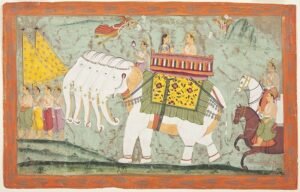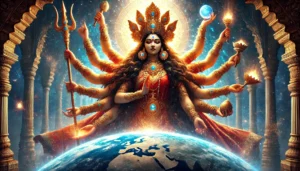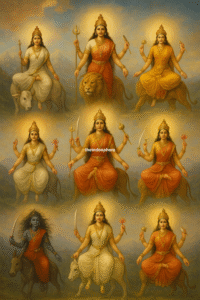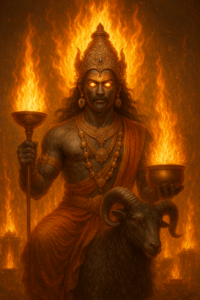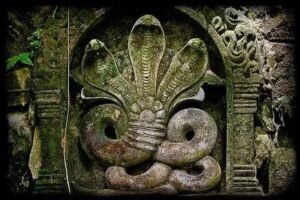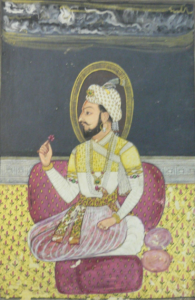Understanding Hindu Concepts: Devi, Devta, Bhagwan, Ishvara, and Brahman
Hinduism, one of the world’s oldest religions, encompasses a variety of profound concepts that explore the nature of the divine, the self, and the universe. Central to this exploration are the terms “Devi,” “Devta,” “Bhagwan,” “Ishvara,” and “Brahman,”. These terms represent different facets of divinity and spiritual philosophy within the Hindu tradition. Below is an expanded discussion of each concept, incorporating a nuanced understanding of their roles and significance.
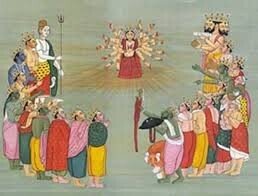
Devi: The Divine Feminine
- Definition: “Devi” refers to goddesses within Hinduism, embodying the divine feminine. The word “Devi” literally means “goddess” and is used to describe the various forms of female divinities worshiped in the tradition.
- Role in Hinduism: Devi is central to Shaktism, a major Hindu denomination that emphasizes the worship of the feminine energy known as Shakti. This energy is believed to be the source of all creation and power.
- Key Devis:
- Durga: The warrior goddess who fights evil and protects the righteous.
- Lakshmi: The goddess of wealth, prosperity, and fortune.
- Saraswati: The goddess of knowledge, music, and the arts.
- Philosophical Significance: The worship of Devi underscores the importance of feminine energy in the cosmos. It represents balance, nurturing, and the creative force that drives the universe.
Devta: Deities and Divine Beings
- Definition: “Devta” is a broader term that refers to deities or gods. These divine beings are often associated with natural forces, moral principles, or cosmic functions.
- Role in Hinduism: Devtas are worshipped across various aspects of life, each governing different domains such as health, wealth, education, and protection. They are seen as intermediaries between humans and the ultimate reality (Brahman).
- Categories:
- Vedic Gods: Early gods like Indra, Agni, and Varuna, who are invoked in Vedic rituals.
- Puranic Gods: Later deities such as Vishnu, Shiva, and Brahma, who play central roles in Hindu mythology.
- Philosophical Significance: Devtas represent the personification of natural elements and moral values. They are integral to the understanding of dharma (moral order) and are often invoked in prayers and rituals for guidance and blessings.
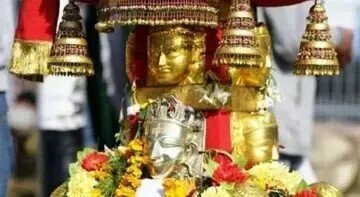
Bhagwan: The Embodiment of Divine Qualities
- Definition: “Bhagwan” refers to a revered figure embodying divine qualities and power, rather than a monotheistic single God. It denotes a respected deity with attributes that reflect the supreme reality.
- Role in Hinduism: Bhagwan is often used to refer to deities like Vishnu, Shiva, and Krishna, who are considered manifestations of divine power and qualities. It emphasizes their role in maintaining cosmic order and their compassionate involvement in the world.
- Philosophical Significance: The concept of Bhagwan illustrates the multiplicity and accessibility of the divine in Hinduism. It allows devotees to form personal connections with different aspects of divinity based on their needs and inclinations.
“Devi” refers to goddesses and the divine feminine, “Devta” is a broader term for deities or gods, and “Bhagwan” encompasses the ultimate divine reality in Hinduism. These terms reflect the rich and diverse pantheon of Hindu deities and the various ways in which the divine is conceptualized in the tradition.
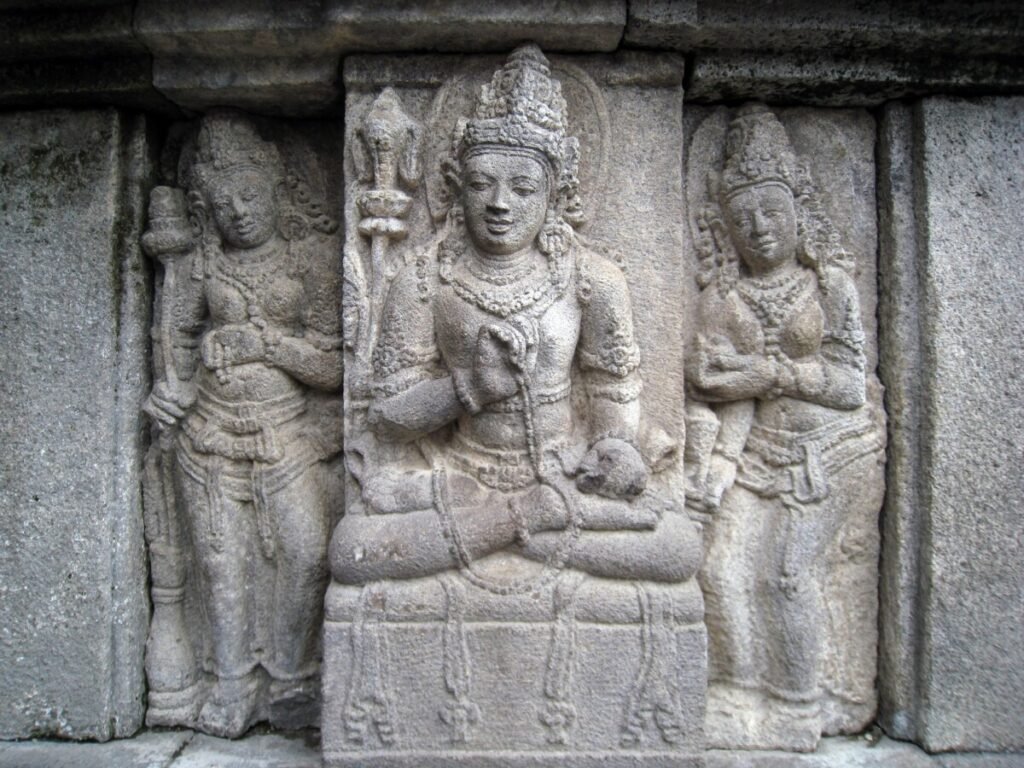
In Hinduism, there are several terms and concepts used to define and describe the divine, reflecting the rich and diverse nature of the religion. Here are some additional words and concepts related to the divine in Hinduism:
Ishvara: The Personal God
- Definition: “Ishvara” refers to a personal god, often identified with Bhagwan, who is seen as a creator, preserver, and destroyer of the universe.
- Role in Hinduism: Ishvara is a central figure in many schools of Hindu philosophy, particularly in the theistic traditions such as Vedanta. Unlike Brahman, which is abstract and impersonal, Ishvara is a deity with whom devotees can establish a personal relationship.
- Philosophical Significance: Ishvara represents the personal dimension of the divine, making it easier for devotees to comprehend and worship. It bridges the gap between the transcendent Brahman and the individual soul (Atman).
Brahman: The Universal Consciousness
- Definition: “Brahman” is the ultimate reality in Hindu philosophy, representing the infinite, eternal, and all-pervading consciousness that underlies the universe.
- Role in Hinduism: Brahman is not a personal god but an abstract, impersonal principle. It is beyond description, gender, and form, embodying the essence of everything in existence.
- Philosophical Significance: Brahman is the foundation of Hindu metaphysics. It is considered the source from which all beings and the universe emanate and into which they ultimately dissolve. The realization of Brahman is the goal of spiritual practice in Hinduism, leading to liberation (moksha).
Additional Hindu Concepts: Atman, Paramatman, Avatar, Saguna, Nirguna, and Yajna
To further deepen the understanding of Hindu philosophy, we can explore the concepts of Atman, Paramatman, Avatar, Saguna, Nirguna, and Yajna. These terms provide insight into the nature of the divine, the process of manifestation, and the importance of rituals in Hindu practice.
Atman: The Inner Self
- Definition: “Atman” refers to the individual soul or self, which is believed to be identical with Brahman in its true essence.
- Role in Hinduism: Atman is considered the innermost essence of a person, beyond the physical body and mind. Realizing the unity of Atman with Brahman is the core of Hindu spiritual practice.
- Philosophical Significance: The concept of Atman emphasizes the divine nature of the self. In the Advaita Vedanta school, the realization that Atman is non-different from Brahman is the key to spiritual enlightenment and liberation from the cycle of birth and death (samsara).
Paramatman: The Supreme Self
- Definition: “Paramatman” refers to the Supreme Self or the highest aspect of Atman, the universal spirit or soul that is identical to Brahman.
- Role in Hinduism: Paramatman is considered the inner self of all beings, transcending individuality and representing the ultimate, unchanging reality.
- Philosophical Significance: The concept of Paramatman emphasizes the unity of all living beings with the divine. It is the aspect of Brahman that resides within each person, guiding them towards spiritual liberation and the realization of their true nature.
Avatar: Divine Incarnation
- Definition: An “Avatar” is a divine incarnation, where a deity descends to earth in a physical form to restore dharma (righteousness) and guide humanity.
- Role in Hinduism: Avatars are most commonly associated with the god Vishnu, who is believed to have ten primary incarnations, including Rama and Krishna.
- Philosophical Significance: The concept of Avatar highlights the compassionate aspect of divinity, where the divine takes a human or other physical form to intervene in the world. It signifies the closeness of the divine to the human experience and the cyclical nature of cosmic order.
Saguna and Nirguna: Attributes of the Divine
- Saguna Brahman:
- Definition: “Saguna” refers to the aspect of Brahman with qualities or attributes, often personified in deities with specific forms, names, and characteristics.
- Role in Hinduism: Saguna Brahman is worshiped in various forms such as Vishnu, Shiva, or Devi, allowing devotees to relate to the divine in a more personal and tangible way.
- Philosophical Significance: Saguna Brahman makes the abstract concept of the divine accessible to human understanding and devotion, serving as a bridge to deeper spiritual realization.
- Nirguna Brahman:
- Definition: “Nirguna” refers to the aspect of Brahman without qualities, representing the formless, infinite, and unmanifested reality.
- Role in Hinduism: Nirguna Brahman is the ultimate, transcendent aspect of the divine, beyond all forms and descriptions.
- Philosophical Significance: Nirguna Brahman emphasizes the ineffable nature of the ultimate reality, which transcends human understanding and is realized through deep meditation and self-inquiry.
Yajna: Sacred Ritual
- Definition: “Yajna” is a Vedic ritual of offering and sacrifice, traditionally performed by priests to honor the gods, maintain cosmic order, and seek blessings.
- Role in Hinduism: Yajna involves offerings such as ghee, grains, and soma, which are poured into a sacred fire accompanied by the chanting of mantras.
- Philosophical Significance: Yajna symbolizes the interconnectedness of the cosmos, where sacrifice is seen as a means of sustaining and renewing life. It also represents the principle of selfless action, where offerings are made without attachment to the results, embodying the spirit of karma yoga.
Conclusion
The concepts of Paramatman, Avatar, Saguna, Nirguna, and Yajna, along with those of Devi, Devta, Bhagwan, Ishvara, Brahman, and Atman, form a comprehensive understanding of Hindu theology and are fundamental to understanding Hinduism’s diverse philosophical landscape. Each term represents a different aspect of how the divine is perceived and worshiped, ranging from the personal and tangible to the abstract and infinite. Together, they provide a comprehensive framework for the exploration of spirituality and the ultimate truth in Hindu thought.
These concepts illustrate the depth and complexity of Hinduism, where the divine can be both a personal deity and an impersonal absolute, reflecting the multifaceted nature of existence and consciousness.

